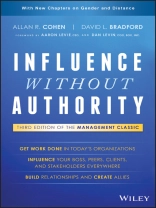Get what you need to achieve your objectives and produce results
Influence Without Authority is the classic guide to getting what you need from people you don’t control. Getting things done requires collaboration, and convincing others to contribute requires political skill; this book introduces the Exchange Model, in which you get what you need by offering something of value in return. The key lies in knowing what the other person values—that’s their ‘currency, ‘ and it’s your immediate tool for coaxing their cooperation. This model has been proven over decades, as organizations around the world have turned away from frustration and resignation toward collaboration and results. This book shows you how to implement the Exchange Model at the personal, team, and organizational level to raise the bar for performance and leadership.
This new third edition has been updated reflect the changing face of the workplace, and includes new examples and information on geographically dispersed virtual teams. Supplementary materials facilitate classroom and training use with discussions, role-play, videos, and other ancillaries that deepen understanding and promote practical application.
- Get what you need from the people who have it through mutual exchange
- Think in terms of interest, and pinpoint the ‘currencies’ other people trade in
- Apply the Exchange Model across entire organizations to lead major change
- Learn practical real-world strategies for influencing those you do not control
The ability to influence those not under your authority is becoming ever more valuable. Organizations are flattening, and outside contractors are taking on larger roles than ever before—getting results now means lateral cooperation, often across borders, time zones, organizations, and more. Influence Without Authority provides a proven model for success in this new environment, with expert guidance for real-world application.
表中的内容
Foreword ix
by Aaron Levie and Dan Levin
Acknowledgments xi
Part I Introduction 1
Chapter 1 Why Influence: What You Will Get from This Book 3
Part II The Influence Model 17
Chapter 2 The Influence Model: Trading What They Want for What You’ve Got (Using Reciprocity and Exchange) 19
Chapter 3 Goods and Services: The Currencies of Exchange 37
Chapter 4 How to Know What They Want: Understanding Their Worlds (and the Forces Acting on Them) 57
Chapter 5 You Have More to Offer Than You Think If You Know Your Goals, Priorities, and Resources 77
Chapter 6 Building Effective Relationships: The Art of Finding and Developing Your Allies 95
Chapter 7 Strategies for Making Mutually Profitable Trades 113
Part III Practical Applications of Influence 137
Chapter 8 Gender and Influence: Beyond Stereotypes (Coauthor, Nan Langowitz) 139
Chapter 9 Influencing Your Boss 165
Chapter 10 Working Cross-Functionally: Leading and Influencing a Team, Task Force, or Committee 183
Chapter 11 Influencing Organizational Groups, Departments, and Divisions 193
Chapter 12 Can You Hear Me: Influencing at a Distance 205
Chapter 13 Influencing Difficult Colleagues 225
Chapter 14 Initiating or Leading Major Change 233
Chapter 15 Understanding and Overcoming Organizational Politics 249
Chapter 16 Hardball: Escalating to Tougher Strategies When You Can No Longer Catch Flies with Honey 263
Appendix A: Extended Case Examples and Supplementary Material Available on the Web 279
Appendix B: Additional Resources 285
Notes 287
Index 295
关于作者
ALLAN R. COHEN is Distinguished Professor of Global Leadership at Babson College, in residence at the San Francisco campus. He has consulted on organizational change and leadership at a wide variety of organizations, including GE, Polaroid, IBM, and F/P Private Equity, and holds MBA and DBA degrees from Harvard Business School.
DAVID L. BRADFORD is Senior Lecturer on Organizational Behavior Emeritus at Stanford Graduate School of Business and former Director of Stanford’s Executive Program in Leadership. He has consulted for a wide array of companies, including Frito-Lay, Levi Strauss & Co., Net Ledger, Auto Desk and the Whitney Museum of American Art.
Cohen and Bradford are the authors of Managing for Excellence and Power Up, both from Wiley.












